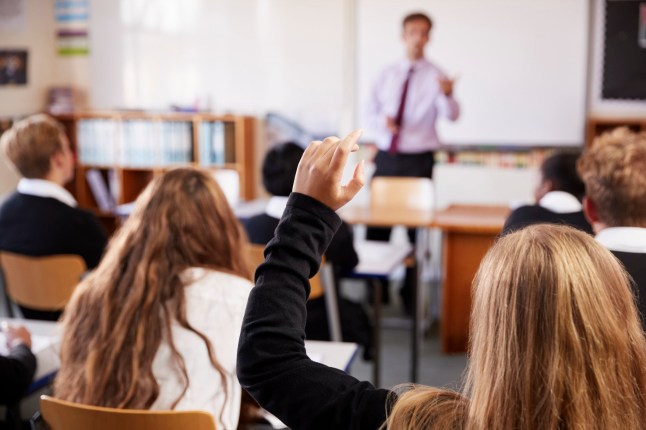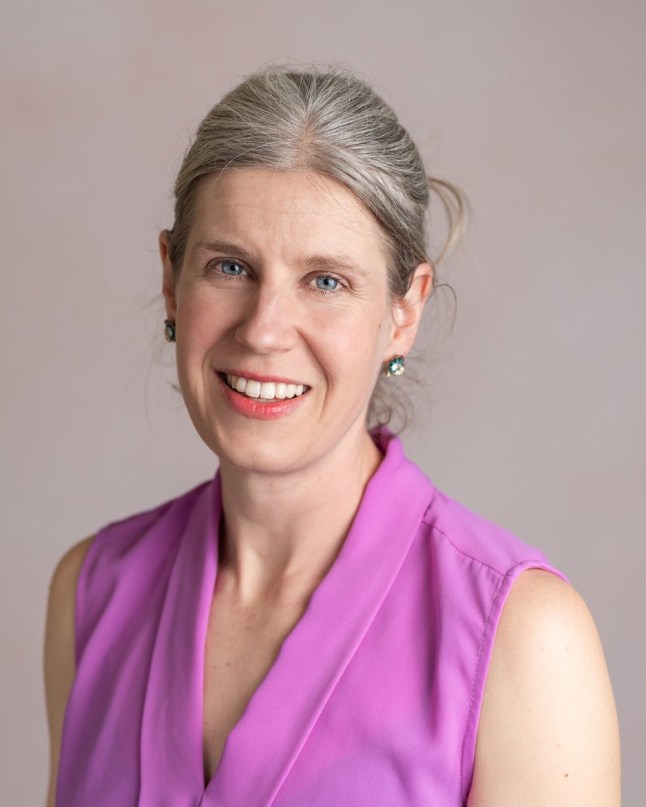
A controversial government proposal to ban sex education for children under the age of 13 has been revealed.
The new age limit is set to ban teaching children about ‘explicit’ topics, including changing their gender until they are 13, The Times reports.
Currently, children can be taught about sex and sexual health, including contraception, when they start secondary school at the age of 11.
Schools could be limited on discussions the government considers ‘explicit,’ such as contraception and changing gender identity.
It means children would not be taught about contraception, STIs and abortion until the age of 13.
Sorry, this video isn't available any more.
Discussions of sexual acts would be delayed until year 9, meaning some children might not learn about abortion or STIs until they are 13 or 14.
Schools should not teach young people about domestic violence until year 9.
The revised sex education guidance due to be announced by the education secretary Gillian Keegan is expected to put other restrictions on teaching about gender and identity.
It is thought teachers will be told to explain ‘biological’ facts when discussing gender, The Guardian reports.
She is also expected to consult on a ban to stop schools from teaching sex education of any type before children are nine.
While the details are being finalised, The Telegraph reports that the guidance is set to describe ‘gender ideology’ as a ‘contested subject,’ and that teachers must say that there are two biological sexes.
Schools will also be required to show parents samples of the material they use to educate their children, which is already a requirement in some cases.
It reportedly comes after concerns that some children are being taught age-inappropriate relationships, sex and health education, according to The Times.
However, critics have described the move as political.
Caroline Lucas, MP for Brighton Pavilion said on X (formerly Twitter) that ‘politicising sex education is unforgivable dangerous and reactionary,’ adding that it is always age appropriate to teach children how to stay safe.
What age does sex education start in schools in the UK?
The new guidelines are expected to be more detailed on what can be discussed at what age.
Currently, all children must be taught relationships, sex and health education.
But the style and content vary depending on the school year and where in the UK you live.
In primary schools, children must now receive relationships education after changes to the law in September 2020.

Young people in secondary school must be taught relationships, sex and health education (RSHE).
However, the quality and scope of sex education can vary ‘widely’ between schools, the Family Planning Association has warned.
What do you learn at what age?
The existing guidance sets out broad topics for children aged five to eleven in primary school.
They will learn about different types of families and healthy relationships, including friendships and boundaries.
Currently, primary schools are allowed to teach additional sex education, but it is not a requirement, the guidance says.
However, they already have to consult parents before the final year of primary school about what sex education is being taught.
Primary school, ages five to 11
By the end of primary school, children should know about:
- Healthy and caring family and friendships
- Other families and relationships may look different to theirs and they should respect differences
- Marriage is a formal and legally recognised commitment of two people and it is intended to be lifelong
- How to recognise if relationships are making them feel unsafe
- Self-respect
- Different types of bullying, including cyber bullying, its impact and responsibilities of bystanders and how to report it or get help
- Harms of stereotypes
- Being safe online and in the real world
- That each person’s body belongs to them and differences between inappropriate and appropriate contact
- How to seek help and reporting concerns, abuse, and learning the words to do so
Because sex education in primary schools is not mandatory, the current guidance to schools focuses on relationship education.
However, schools are allowed to teach sex education in primary school under the current guidance.
And if that goes beyond the national science curriculum, schools have to set it out in their policy and consult with parents.
Then in secondary school, children are taught more complex topics such as puberty, sexual relationships, consent, unsafe relationships and online harms.
In secondary school when children are aged between 11 and 16, they can be taught about sex, sexuality and gender identity ‘in an age-appropriate and inclusive way,’ the current guidance says.
The official guidance says that when teaching these topics, schools must recognise that ‘young people may be discovering or understanding their sexual orientation or gender identity.’
Secondary school, 11 to 16
In secondary school, children are taught more about sex and relationships.
It includes:
- Different types of relationships
- What marriage is, including legal rights
- Other types of relationships
- Responsibilities of parents
- Relationships and friendships, including trust, respect, reconciliation and ending relationships
- Harmful stereotypes relating to sex, gender, race, religion, sexual orientation and disability
- Online safety and risks, including not sharing material to others they want to keep private
- That sexually explicit material like pornography presents a distorted picture of sexual behaviours
- That sharing and viewing indecent images of children is a criminal offence
When it comes to sex, sexual relationships and health, they are taught:
- How to recognise positive intimate relationships
- Their choice when it comes to sex and relationships and wellbeing
- Facts about reproductive health, including potential impact of lifestyle on fertility and menopause
- How to manage sexual pressure, including peer pressure
- That it is their choice to delay sex or to enjoy intimacy without sex
- Contraceptive choices and options
- Facts around pregnancy and miscarriage
- Sexually transmitted infections
- How the use of alcohol and drugs can lead to risky sexual behaviour
- Where to get advice
Children should be given an ‘equal opportunity to explore the features of stable and healthy same-sex relationships,’ it says.
The guidance leaves room for schools on how they decide to teach sex education.
But it does say young people in secondary school should be ‘made aware’ of the relevant legal aspects around marriage, consent, violence against women and girls, sharing nudes and ‘sexting’, pornography, abortion, sexuality and gender identity among others.
Reaction to the sex education proposal
Lucy Emmerson, chief executive of Sex Education Forum, told Metro.co.uk that the proposal is ‘so out of reality’ and it leaves young people, schools and parents confused.
She said: ‘This is going to build a gap, where young people are forced to find out information online instead of having answers from their teachers at school.’
The charity boss said what she has read so far is ‘quite confusing.’
‘And schools will be feeling quite confused: don’t say anything about sex, but keep children safe. It’s hard to make head or tail about that,’ she said.

She said all children 12 to 13 are offered the HPV vaccination in schools, but under the proposal, children should not be taught about STIs until they are 13 or 14.
‘Young people know about STDs, they have alternative methods, but raising questions at school in safety is important,’ she said.
She feared that banning talking about certain topics like gender identity gives a ‘very strong message to young people, the message that this it not allowed,’ which can lead to a culture of secrecy.
‘Saying certain things are not allowed to be discussed is a strange approach. Young people with genuine questions can’t raise them.
‘What does that mean about talking about other parts of identity?’
Imposing a ‘culture of fear’ on schools would be ‘taking a step back,’ Emmerson warned.
She continued: ‘We would like to see what evidence has gone into these proposals in order to take them seriously. We are yet to see what research-based evidence has gone into it.’
The Department for Education declined to comment.
Campaigner Evie Plumb has previously said that sex ed in schools is nowhere near the level it should be.
Speaking to Metro.co.uk podcast Smut Drop, she said people need to understand bodily autonomy to help them ‘advocate for yourself, whether that’s in the bedroom or at the GP.’
She warned that sex education needs to start early – despite parents’ fears as a lot of early sex ed should be about consent in all aspects of life.
How UK sex education compares to other countries?
Sex education varies from country to country, but some are further ahead than others.
Sweden made sex and gender education mandatory in 1955 and it has kept updating the curriculum regularly.
It is said to go beyond just sex as children learn about alcohol and mental health and attempts to eliminate ‘prejudices and taboo,’ the European Academy of Religion and Society reports.
Italy is a bit of an anomaly compared to the rest of Europe when it comes to sex ed.
Schools in the largely Catholic country can decide if they want to teach it at all and how they do it.
A national survey carried out by the Ministry of Health in 2019 showed that majority of young Italians get their information online.
What about the US?
As most policies and laws in the country, the 50 states can decide how they want to cover sex education.
More Trending
What is covered varies widely from state to state, so getting quality or any sex education is a postcode lottery in the US.
Only 39 states and the Washington, District of Columbia, have ‘mandated sex-education,’ the Duke Centre for Global Reproductive Health said.
It warned that the sex education in the country is in ‘shambles.’
Are you a teacher or a parent? Please email noora.mykkanen@metro.co.uk to share your thoughts on the sex ed proposal.
Get in touch with our news team by emailing us at webnews@metro.co.uk.
For more stories like this, check our news page.
MORE: Cassie brands Diddy ‘pathetic’ after his grovelling apology for assaulting her in leaked footage
MORE: Gavin and Stacey star spills major cast news about upcoming Christmas special episode
MORE: Iranian president dubbed ‘the Butcher of Tehran’ killed in helicopter crash













